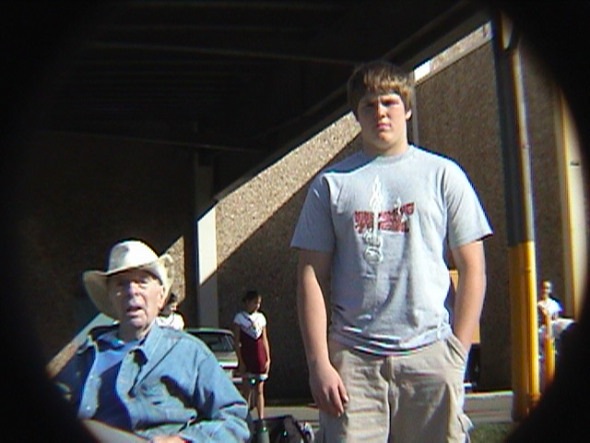
The best bread in the Sandwich Generation. All that’s missing is a baby boomer in the middle. Image via DG Studios
If elderly people depend on you, you’re in the Care Age.
Ages come in different names defined by the dominant materials like the Stone Age, Bronze Age, Iron Age.
Epochs and eras all have names.
If you find artifacts made in America before the explorers got here, they’re called Pre-contact, as if everything after early exploration was something less. Post-contact doesn’t come up often.
World Wars are a turning point, as in pre-WWI, or post-WWII dates.
The Care Age comes at any time in the history of earth that includes looking after elderly people who need your help.
If you’re a baby boomers chances are good you’ll live in the Care Age sooner than later.
The Care Age means being a caregiver. Caring isn’t optional. Caring enough is another question.
Even if you’re the main caregiver for someone you don’t like, you have to care enough not to get blamed for their decline and death.
No one wants to answer the question, “Why didn’t you care more?”
Whether you like or dislike someone in your care, put it aside. They’re not the same person you disliked; they are someone in need.
And you’re not the same person who disliked them from the other side. You see a human side, your human side, and that means bringing your best to the afflicted.
If you’ve been a parent you’ve got a blueprint for the Care Age.
You kept your kids bathed, fed, and ready for the day. Anything less reflected poorly on you as a parent, a person, a biological entity.
No one expects face of meth mom or strung out on black tar heroin dad to shine in a parent roll, though I could be wrong. Those folks have their own self care issues before any other.
If you’re sober enough to consider caregiving, you have questions.
What to expect in the Care Age
People outside the caregiver spectrum will ask, “Do you have a real job yet, or are you still wiping your old man’s butt?”
If they’ve visited and seen your routine they say, “Man, I’ll bet you’re sorry you ever volunteered for this.”
A visiting nurse will say, “Well, this sure seems comfy for him, but too bad for the rest of you.”
You’ll hear this from friends and family and complete strangers consumed by the fear they might be in your shoes one day.
Care Age shoes: one size does not fit all
Every caregiver has a care recipient. Those are the players in the Care Age.
Some recips are dying, act like they’re dying, or dying ever so slowly.
Death isn’t like birth where you can schedule a C-Section, or induce labor.
A caregiver isn’t a vulture perched on a dead branch. You can’t give the feeling of imminent doom.
Instead, you carry on like you and your recip have all the time in the world. No task too big, no mess too revolting, is the motto. Do anything less and end up in:
The Bad Care Age Hall of Fame
Here’s how you get there:
1. You Don’t Smoke?
If you want to create empathy with a loved one, light up. You’re a caregiver, which means you have someone you care ‘for.’ It’s not the same as care ‘about.’
John Hinckley cared about Jodie Foster and look how that turned out.
Caring for someone means that particular someone can’t care for themselves as well as they used to. They have a disease or a handicap. By smoking you give yourself a handicap.
Your loved one may complain about the stench of stale tobacco and your brown teeth, but deep down they know you’re doing it for them.
Show how much you care, grab a carton of Camels. Leave the ‘lights’ alone; leave the filters alone; grab a carton of Camel straights and do it up right.
2. You’re Not Overweight Enough.
Obesity is a handicap, like smoking, and your care recipient welcomes the extra side rolls and the chins drifting down the front of your neck. If you can’t make it to Super Obese with a body mass index of more than 45 or 50, then go for Morbidly Obese with a BMI of 35 or 40.
Severe Obesity at 35 shows you’re just not trying hard enough. If you fail to achieve Severe Obesity you may be more comfortable caring for Asians. Japan charts obesity after a BMI of 25, China starts at 28.
An enormously fat caregiver shows their loved one the only message that matters. A sick person sees the weight and thinks “Man, I’m doing better than them.”
Later tonight, around 11, turn on a Seinfeld re-run and open another box of little chocolate donuts.
Do it because you care about the Care Age
3. You’re On Time.
Disease runs on its own clock. The medications used to control disease run on their own clock. With that many clocks running on their own time you’ll only be disruptive by adding real time.
If you’ve worked up to two packs of Camel Straights a day and gained sixty pounds in the last few months, don’t ruin the progress by being on time.
If you need an excuse just say you had to stop by the smoke shop, or you had to wait for Chick-fil-A to change their breakfast menu to lunch.
All dedicated caregivers know the importance of a mid-morning snack and the mid-mid-morning snack after the menu change.
That’s the only clock you need.
4. You Clean.
Don’t insult your loved one. You know they have no sense of smell. Besides, they are non-verbal; if they thought things didn’t smell right they couldn’t say anything.
Cleaning is selfish. You know it’s only for you, and so does your loved one. Why create doubt where they will wonder what other selfish things you’re doing behind their back.
If you clean too much, your loved one may also suspect you’re not smoking and eating enough. If you must clean, go ahead, but if you cut down on the Camels, start chewing. If your loved on suspects you’re not as handicapped by smoking as you should be, just give them a big Red Man chew smile.
Any weight loss means adding convincing padding. Don’t get caught with a fake fifty pounds; avoid lumpy throw-pillows under your belt.
5. You Cook.
If Rice-A-Roni is good enough for San Francisco, it’s good enough for you. No one’s asking you to make a five-hour pan of paella.
Don’t think saffron and bomba makes a difference to anyone but you. Put down the olive oil and step away from the paellera.
Some people say cooking completes them, others say the same about the clean-up. If you must cook, choose carefully. Start with bacon.
How many pounds of bacon does it take to generate enough grease to fry a loaf of bread one piece at a time?
You should know this.
How many cubes of butter can you melt into the gravy you’ll pour onto white flour biscuits?
As many as you can.
Bon Appetit in the Care Age
6. No Prison Record.
Someone needing a caregiver is someone interested in a lifestyle rebound. It’s the same with an ex-con.
You’re in this together and there’s no better proof of your commitment than a mandatory-minimum sentence. It’s even better if you’ve gone through a year of boot camp to reduce the time.
That’s motivation.
Do you want your loved one to know you feel the pain, the isolation, of their condition? Tell them about the time you spent in the hole for shiving a prison pimp after he charged an extra cigarette for weekend dates.
Now that’s a bedtime story.
A prison sentence for theft and fraud is a boost to a care recipient. Imagine being so sick you are bedridden in a dark room. Now imagine the electric charge you’d feel if you thought your caregiver was fleecing you while you were down?
If you don’t have the benefit of a prison term, there is help.
Job candidates in big companies and colleges have access to fake degrees. They go from an AA at the local community college to a PhD from Yale overnight. How hard would it be to dummy up prison release forms?
When it comes to quality care, prison paper is better than a nursing diploma.
7. Honesty.
The most important words in caregiving are, “Everything is fine.”
Only a Debbie Downer says otherwise.
Problems with Medicare, Medicaid, insurance companies, and the assisted living facility that went bankrupt and re-opened and now thinks you owe thirty-seven thousand dollars, including interest, penalties, and fees from two years ago?
“Everything is fine.”
You find an open sore on your loved one’s ankle because the lap dog you bought for comfort care is more an ankle dog and you didn’t check their feet for a month?
“Everything is fine.”
You forgot to buy food so you throw all the leftovers in a blender with lumpy buttermilk and whip up a smoothie?
“Everything is fine.”
Now find a mirror to look into and do a checklist:
You don’t smoke.
You’re not bigger than a house.
Meals and meds are all on schedule.
The washer and dryer get a good work-out, so does the mop and broom.
You make familiar food without the added health risks of less informed cooks, and you didn’t learn it in prison.
You may never be the best caregiver in the world, but you might be the best person for a loved one.
Now go and make them laugh. You’re on.


